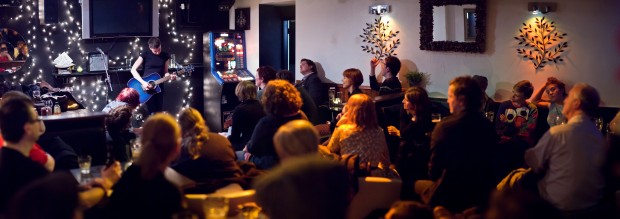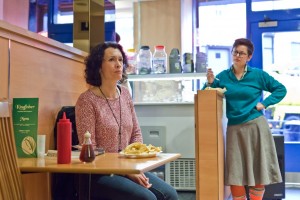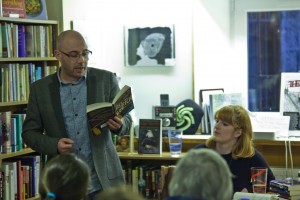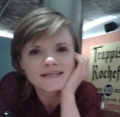You have no items in your cart. Want to get some nice things?
Go shopping

When people hear the word ‘festival’ there are many images that may spring to mind: fields of swaying glowsticks shining brightly à la Glastonbury; beer, saurkraut and wurstl flowing freely at Oktoberfest; or throngs of costumed theatrical types and aspiring comedians flocking to the Edinburgh Festival Fringe, to name just a few. Besides these larger scale festivals there are lesser-known literary gems popping up all over the UK that are worth seeking out.
This is particularly true in Edinburgh, a city with winding alleyways, full of literary secrets. The brickwork, wintery blue skies and cobbled streets have inspired writers for centuries. This inspiration led to a small group of Edinburgh residents rallying together to create the West Port Book Festival. Commonly known as Edinburgh’s Soho, West Port is a patchwork quilt of a neighbourhood described by festival organisers as ‘a heady mix of booze, bosoms, bespoke tailoring and books’. Once a year, for four days, the numerous secondhand bookshops, art spaces and traditional pubs that line the West Port streets become the setting for days filled with poetry readings, artistic demonstrations and literary discussions. Now in its fifth year, the West Port Book Festival has previously appeared in June, May and October. This year, organisers chose November to warm the literary and artistic hearts of ‘Auld Reekie’ ahead of a chilly winter.
As a late-November working day drew to a close on a damp and dark Friday, I headed to Inspace, the bright venue for Take Tea with Turing, the first of two West Port events I’d chosen to sample on the festival’s debut evening. The event also marked the December launch of an anthology of creative work inspired by Alan Turing compiled and edited by Viccy Adams, writer in residence at the School of Informatics, University of Edinburgh, and it proved to be a wonderful insight into Turing’s life and work. In a world of non-stop Facebook posts and Twitter updates, the readings and poetry in the anthology allowed the audience to take a moment to think upon the legacy of a man considered by many to be the father of computer science, whose discoveries radicalised the way we communicate. Upon hearing these original interpretations of his work through poetry, short stories, animation—there was even a poem read by a robot—my friend and I were led into a debate about what it was Turing had set out to discover. Having subsequently inspired and educated us within hours of its opening, the mission of West Port was well on its way.
I slipped out of Turing ahead of the end in order to make it in time for my second event, hosted by Rally & Broad, which was due to start at The Cuckoo’s Nest, a rough-around-the-edges but cosy Scottish pub with a small event space in the basement. It was a sell-out event, and the intimate venue brimmed with an atmosphere of anticipation for the literary, musical, tongue-twisting evening that the team of Rally & Broad had thrown together especially for West Port. Showcasing the story-weaving skills of former Edinburgh Film Festival director, Hannah McGill, the musical talents of Liz Cronin and the whimsical and elaborately crafted poetics of Luke Wright, the show was a feast of lyrical delight. The cleverly created poetry puns and well-delivered prose introduced a new crowd to Rally & Broad’s monthly event that happens elsewhere in the city, and guaranteed a great start to a West Port weekend.

Saturday had something for those with a flair for the arts, as the fine art of book repair was demonstrated by Edinburgh specialist Orlene McIlfatrick and the intricacies of printmaking was revealed by resident artist and business owner, Isabelle Ting of the Owl & Lion Bindery on West Port. For those alternatively seeking something with a more literary bent, there was an intriguing “atmosphere screening” of the 1996 film The Pillow Book, starring Ewan McGregor. The film’s interweaving concerns for poetry and calligraphy was explored—the protagonist Nagiko’s father has written characters of good fortune on her face—as over the course of the evening a model’s body was gradually covered up with calligraphy.
Sunday held more literary delights with a reading from an author in the local chip shop Kingfishers, certainly one of the more unique venues in West Port programme, and with free chips to boot. With the title, Saturday night, Sunday morning, Vicki Jarrett offered an insight into her novel Nothing is Heavy, following three characters over the course of one intense Saturday night. Unaware that their lives are already intimately connected by a previous tragedy, their fates collide again with completely unpredictable results. Kingfishers was an apt venue to hear this particular extract delivered by the author, which described the first meeting between two of the main characters that takes place in the fictional Deep Sea chippy.

In the afternoon there was a feature in the programme for readers and writers of young adult fiction, with a discussion between prominent writers Keith Gray, Rod Gill and Daniela Sacerdoti. As an aspiring young adult fiction writer myself, I had particularly looked forward to this event. I’d missed Patrick Ness and Keith Gray at the Edinburgh International Book Festival and here was another chance to hear the work and opinions of published children’s authors. The event began with readings from each author. Keith Gray read from his prizewinning novel Ostrich Boys, Daniela Sacerdoti from Dreams—a novel from the Sarah Midnight Trilogy—and Roy Gill from his debut fantasy novel Daemon Parallel. Each reading touched upon one moment and one experience for the central character. Ostrich Boys intricately describes the experience of a teenage boy’s first bungee jump. Dreams depicts the mystical world Sarah must pass into when she dreams to eliminate demonic threats. Daemon Parallel details a fantastical journey through an endless mystical department store, just to find the right department. Following this, a discussion was led by Hannah Trevarthen, Assistant Programmer for Edinburgh International Book Festival, that delved deeper into issues relating to writing literature for young adults. Each author enthusiastically contributed to the conversation about the ever-evolving young adult and children’s fiction market, how this development affects writers and the choices available to readers as a result. It was suggested that the publication of Harry Potter and Philip Pullman’s Dark Materials trilogy has led to a stronger cross-over between fantasy fiction and young adult fiction, opening the field up to more recent series such as The Hunger Games.

Little did I know what more was in store, as following the talk, I found myself in the neighbouring pub sitting with Keith Gray, Hannah Trevarthen, Roy Gill, Emily Dodd (poet and Reader in Residence at Leith Library in Edinburgh) and Janne Møller (Daniela Sacerdoti’s editor from Black & White Publishing). We proceeded with a conversation on the topic of publishing and children’s fiction, which made for a fantastically unpredictable afternoon. Such is the power of West Port!
On Monday evening a discussion on the Future of Festivals wound up a long weekend on the perfect note. Chaired by Peggy Hughes, Programme Director for West Port, who led Nick Barclay, Edinburgh International Book Festival Director, and Lisa Dempster, director of Melbourne Writers Festival & the Emerging Writers Festival, this engaging exchange touched upon how festivals may need to adapt to the changing publishing environment in order to ‘future proof’ themselves. With around 400 book festivals currently in the UK, it was stated that eventually there will need to be some form of contraction in the market. Festivals in the future may have to cater to their strengths and focus on creating a personality for themselves, tailoring a programme to a theme or genre or offering an international appeal to connect with different audiences in order to compete with each other. Another option discussed was to integrate the ever-growing audience of social media. The Emerging Writers festival is an excellent example of this, using Twitter to encourage interaction and incorporating an online community to the festival to complement ongoing face-to-face discussion. In 2009, the organisers of West Port themselves were also responsible for the world’s first Literary Twestival, and they can often be found building literary apps, twittering, friending people and blogging.
What does it mean to talk of literary festivals in terms of markets and competition? Festivals such as West Port, Edinburgh and Melbourne are non-profit, and aim to establish space for debate and discussion, to bring people together over common interests. They rely upon the enthusiasm and passion of the organisers and participants, without whom, regardless of market trends, these events would not happen. Then again, these financial issues are an important reality, and if festivals start to disappear due to lack of monetary support, we risk losing these choice events, with fewer opportunities to hear from noteworthy authors, poets and speakers.
Whichever way literary festivals go in the future, West Port is certainly one to remember and cherish. It was very efficiently organised, with quick and easy booking available through EventBrite for popular events and smaller venues alike, making it easier to be able to attend whichever events you wanted. Moreover, with everything free, it was a wonderful opportunity to hear from both published authors and local artists. Six different venues, twenty-four separate talks, presentations, readings and one team of volunteers behind it all, each event had a real sense of community. Supported by local businesses, paid for by sponsors and with money raised through bake sales and charitable donations, it is this overriding community spirit that brings a new and transient audience to West Port over this short time. Long may it continue! I’ll be keeping an eye out to see when it will pop up in 2013, that’s for sure.
For more information on the West Port Book Festival, visit the website.

About Eleanor Pender
An avid film and literature fan, Eleanor has knowledge ranging from Charles Dickens to Rian Johnson. She has reviewed film, theatre, TV and books since 2008 in alternative e-zine, Push To Fire to Edinburgh Festival Fringe paper, ThreeWeeks. She has lived in Durham, Liverpool, Manchester, Edinburgh and Bristol. She is currently working on her first young adult fiction novel.




